MercoPress. South Atlantic News Agency
Tag: British Antarctic Survey (BAS)
-
Saturday, December 18th 2021 - 09:39 UTC
Falklands flagged Sir David Attenborough reaches Rothera Station in Antarctica

Britain’s new polar research vessel, Falklands' flagged RRS Sir David Attenborough, has travelled to Antarctica on its maiden voyage, with its first call on Friday at Rothera Research Station – the UK’s largest Antarctic research station on the continent.
-
Wednesday, December 15th 2021 - 09:39 UTC
HMS Protector pays tribute to explorer Shackleton at South Georgia on her trip to Antarctica
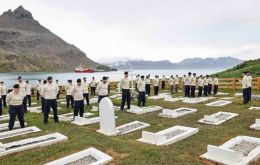
Sailors from Ice Patrol HMS Protector paid tribute to legendary Antarctic explorer Ernest Shackleton – a century after he died pushing the boundaries of polar research. The crew of the icebreaker held a memorial service at his graveside on the island of South Georgia – the latest stop for the survey ship as she heads to the frozen continent for a summer of scientific research.
-
Wednesday, December 15th 2021 - 09:18 UTC
Alarming population declination of the rare Antarctic South Georgia shag
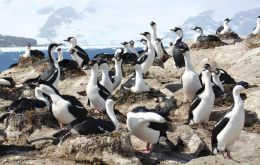
Data collected from a long-term study by British Antarctic Survey (BAS) scientists shows declining populations of an already relatively rare Antarctic seabird, the South Georgia shag. Published in the journal Polar Biology, a 40-year census from Signy Island in the remote South Orkney Islands and a 30-year census from Bird Island, close to the sub-Antarctic island of South Georgia, have shown significant population declines at both locations.
-
Friday, December 10th 2021 - 09:39 UTC
Falklands' flagged RRS Sir David Attenborough reaches “home”; anchored at Port William
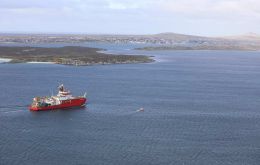
RRS Sir David Attenborough has completed the first leg of its journey to Antarctica, arriving in the Falkland Islands on 9 December. Since the draft of Britain’s new polar ship is too large for it to berth in Stanley harbor, so the ship will anchor north of the Narrows at Port William. However, the ship is visible from vantage points around the coastline.
-
Tuesday, November 23rd 2021 - 09:20 UTC
BAS team to study quick response to whales mass stranding with satellite technology
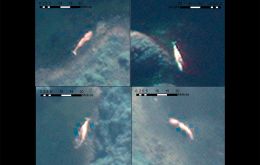
An international team of scientists led by the British Antarctic Survey have published research on using new technology to study mass stranding of whales from space and how the technology could be used to help protect populations.
-
Wednesday, November 17th 2021 - 09:25 UTC
RRS Sir Attenborough off to Antarctica; Falklands' call in three weeks and a half

Britain’s new polar research ship, RRS Sir David Attenborough, departed the UK this week for its maiden voyage to Antarctica. She left Harwich on Tuesday, with 66 crew and personnel on board, for a short stop at Portsmouth to take on fuel before departing the UK by 18 November.
-
Monday, August 23rd 2021 - 12:13 UTC
RRS James Clark Ross has been sold to the Ukrainian Antarctic Scientific Center
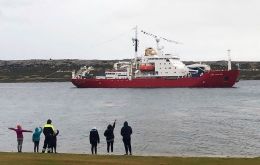
This is the second time that a UK research asset has transferred to Ukrainian research colleagues – the first being the transfer in 1996 of the former Faraday station that is now known as Vernadsky.
-
Tuesday, August 3rd 2021 - 19:51 UTC
Southern right whales at South Georgia acoustic messages, BAS Project report
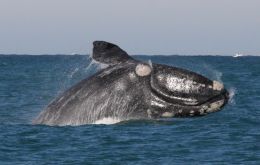
Scientists from British Antarctic Survey (BAS), Scottish Association for Marine Science (SAMS), and international collaborators have this week published the first detailed research on the sounds made by southern right whales on their high latitude feeding grounds at South Georgia.
-
Tuesday, August 3rd 2021 - 06:04 UTC
Polar vessels RRS Sir David Attenborough and RSV Nuyina meet during sea trials
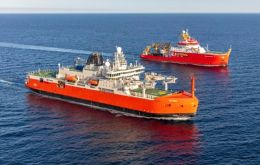
UK and Australia’s two new polar research ships got together off the coast of Falmouth in July during sea trials in preparation for their first Antarctic missions. The state-of-the-art Falklands flagged RRS Sir David Attenborough and RSV Nuyina will enable scientists to understand changes in our planet’s climate, oceans and marine life.
-
Thursday, May 20th 2021 - 07:11 UTC
Giant iceberg breaks away from the Brunt Ice Shelf in Antarctica
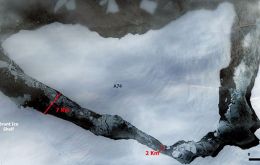
A giant iceberg, larger than the size of most European cities, has broken away from Antarctica, near a British research station, the British Antarctic Survey said on Friday.
